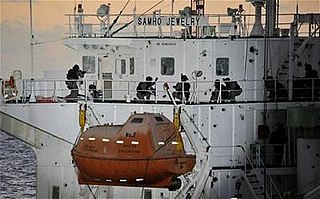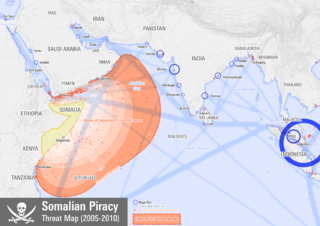External links
- IMO REPORTS ON ACTS OF PIRACY AND ARMED ROBBERY AGAINST SHIPS Annual report – 2006
- IMB 2006 Interactive Piracy Map
The International Maritime Organization states that there were 20 pirate attacks in January 2006, although none were successful. The first quarter of 2006 saw 61 pirate attacks up from 56 the year before. One person was killed by pirates in the Philippines.

Operation Enduring Freedom – Horn of Africa (OEF-HOA) is a component of Operation Enduring Freedom (OEF). The Combined Joint Task Force – Horn of Africa (CJTF-HOA) is the primary military component assigned to accomplish the objectives of the mission. The naval components are the multinational Combined Task Force 150 (CTF-150) and Combined Task Force 151 (CTF-151) which operates under the direction of the United States Fifth Fleet. Both of these organizations have been historically part of United States Central Command. In February 2007, United States President George W. Bush announced the establishment of the United States Africa Command which took over all of the area of operations of CJTF-HOA in October 2008.

Combined Task Force 150 (CTF-150) is a multinational coalition naval task force working under the 34-nation coalition of Combined Maritime Forces and is based in Bahrain established to monitor, board, inspect, and stop suspect shipping to pursue the "War on Terror" and in the Horn of Africa region (HOA) includes operations in the North Arabia Sea to support operations in the Indian Ocean. These activities are referred to as Maritime Security Operations (MSO).

The action of 18 March 2006 occurred when two United States naval vessels were attacked by pirates. The U.S. ships were part of Combined Task Force 150.

The action of 28 October 2007 was part of Operation Enduring Freedom - Horn of Africa, the military operation defined by the United States for combating terrorism in the Horn of Africa. The incident occurred when United States Navy units acted to interdict piracy in the region.
Piracy off the coast of Somalia occurs in the Gulf of Aden, Guardafui Channel, and Somali Sea, in Somali territorial waters and other surrounding places and has a long troubled history with different perspectives from different communities. It was initially a threat to international fishing vessels during the early 2000s, only to rapidly escalate and expand to international shipping during the War in Somalia (2006–2009).

MV Faina was a roll-on/roll-off cargo ship operated by a Ukrainian company that sailed under a Belize flag of convenience, owned by Panama City-based Waterlux AG, and managed by Tomex Team of Odesa, Ukraine.

MV Manifa is an oil tanker formally owned and operated by Vela International Marine. With a length overall of 330 m (1,080 ft) and a capacity of 2.2 million barrels (350,000 m3) of crude oil, she is classified as a very large crude carrier or VLCC. Vela is based in the United Arab Emirates and is a subsidiary of the Saudi Arabian state oil company Saudi Aramco. Sirius Star is one of Vela's 24 tankers, of which 19 are VLCCs. Since her launch, the ship has been registered in Monrovia under the Liberian flag of convenience. She has since been reflagged to Saudi Arabia
Abduwali Abdulkadir Museعبدالولي موسى is a Somali convicted pirate. He is the sole survivor of four pirates who hijacked the MV Maersk Alabama in April 2009 and then held Captain Richard Phillips for ransom. On 16 February 2011, Muse was sentenced to 33 years and 9 months in U.S. federal prison.

The Close Range Naval-91 is a naval version of the Medak 30mm automatic gun installed on the Sarath Infantry fighting vehicle, a variant of the Russian BMP-2 manufactured in India under license by the Ordnance Factory Medak. The Medak gun itself is based on the Russian Shipunov 2A42 30 mm automatic cannon.

Operation Dawn of Gulf of Aden was a naval operation by the Republic of Korea Navy against Somali pirates in the Arabian Sea. The operation was spurred by the pirates' seizure of the South Korean chemical tanker Samho Jewelry. In response, the South Korean government sent a destroyer and 30 naval commandos to retake the ship and rescue its crew. After trailing the tanker for several days and fighting a preliminary engagement that neutralized four of the pirates, the South Korean forces retook the ship by force on January 21, 2011, in a successful boarding action that resulted in the deaths of eight and the capture of five out of thirteen pirates.
The MV York is a tanker for transport of liquefied gas that after its 2010 capture by Somali pirates had become a mothership for pirate operations. The vessel was released on March 10, 2011, after an unknown amount of ransom had been paid.

The Battle of Minicoy Island was a single ship action in January 2011 between Indian naval forces and Somali pirates, during Operation Island Watch. Pirates in the former Thai fishing trawler Prantalay 14 resisted and attacked the Indian Navy patrol vessel INS Cankarso and, in a long surface action off Minicoy Island, the Indians sank the hostile ship and rescued twenty captives.

Operation Ocean Shield was NATO's contribution to Operation Enduring Freedom – Horn of Africa (OEF-HOA), an anti-piracy initiative in the Indian Ocean, Guardafui Channel, Gulf of Aden and Arabian Sea. It follows the earlier Operation Allied Protector. Naval operations began on 17 August 2009 after being approved by the North Atlantic Council, the program was terminated on 15 December 2016 by NATO. Operation Ocean Shield focused on protecting the ships of Operation Allied Provider, which transported relief supplies as part of the World Food Programme's mission in the region. The initiative also helped strengthen the navies and coast guards of regional states to assist in countering pirate attacks. Additionally, China, Japan and South Korea sent warships to participate in these activities.

The Puntland Maritime Police Force (PMPF) is a security force based in Puntland, an autonomous region in northeastern Somalia. As of May 2024, the PMPF had around 4800 personnel. The force is eventually expected to comprise 10,000 personnel.

The action of 7 September 2009 took place when the German frigate Brandenburg, taking part of Operation Atalanta, chased and captured a pirate skiff south of Mukalla, in the Gulf of Aden, after suspicious activity was spotted on the small vessel by the frigate's helicopter during a reconnaissance mission. The boat was disabled by gunfire, and one suspect from her crew was killed. Four individuals were captured and weaponry confiscated and eventually destroyed.
The following lists events that happened in 2009 in Somalia.

Piracy in Somalia has been a threat to international shipping since the beginning of the country's civil war in the early 1990s. Since 2005, many international organizations have expressed concern over the rise in acts of piracy. Piracy impeded the delivery of shipments and increased shipping expenses, costing an estimated $6.6 to $6.9 billion a year in global trade in 2011 according to Oceans Beyond Piracy (OBP).

Somalia–Spain relations are the bilateral and diplomatic relations between these two countries. Somalia has no embassy in Spain, nor Spain in Somalia, but the Spanish embassy in Nairobi is accredited to Somalia.
MV Abdullah, originally named MV Golden Hawk, is a Bangladeshi bulk carrier.